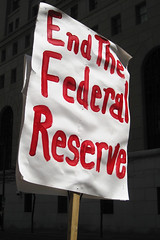| End the Federal Reserve (Photo credit: r0b0r0b) |
The Fed unveiled a third round of bond purchases last month to try to rev up a sluggish economic recovery despite a looming presidential election that some thought might deter action.
Now analysts believe the central bank will wait until at least December to make any changes to its current plans to buy $40 billion of mortgage debt per month.
"With the election in two weeks, the Fed will be in a self-imposed quiet mode this week," said Stephen Stanley, an economist at Pierpont Securities, in Stamford, Connecticut. "Look for a statement that has no more than marginal language changes."
Policymakers have already said they will stick to their open-ended plans to buy bonds until the employment outlook improves substantially, and they are expected to reiterate that intention in a statement due around 2:15 p.m. (1815 GMT).
While officials will likely nod to recent signs of a pickup in economic activity emerging in employment and housing, economists agree that the glimmers of a stronger recovery are too few and far between for the Fed to alter its policy course.
Indeed, it is also likely the Fed will repeat that it expects to keep overnight interest rates near zero through at least mid-2015 and that it intends to keep a highly stimulative policy in place "for a considerable time" after the recovery strengthens.
The Fed, which has held rates close to zero since December 2008, had already bought $2.3 trillion in mortgage-related and government debt before it launched its latest round of stimulus.
TALKING THE TALK
Aside from a discussion over the stance of monetary policy, officials look set to debate fine-tuning their communications strategy by adopting numerical thresholds for economic variables that would guide the central bank's unconventional stimulus.
Chicago Federal Reserve Bank President Charles Evans, for instance, has advocated keeping rates near zero until the unemployment rate, currently at 7.8 percent, goes down to 7 percent, as long as inflation does not exceed 3 percent. The central bank formally targets 2 percent inflation.
Policymakers are also strongly considering the adoption of a consensus economic forecast for the central bank as a whole, as opposed to the quarterly individual projections for growth, employment, inflation and interest rates currently published.
But no announcement is likely until at least December, when the Fed releases its next installment of economic estimates and Chairman Ben Bernanke holds a news conference.
"We do not anticipate that an agreement will be reached at this meeting," said Millan Mulraine, senior U.S. economic strategist at TD Securities, in New York. "However, the tone of the accompanying statement should remain exceptionally dovish, with the Fed offering only modest upgrades to the economic assessment and reiterating its commitment to do more if necessary." ... Continue to read.

No comments:
Post a Comment